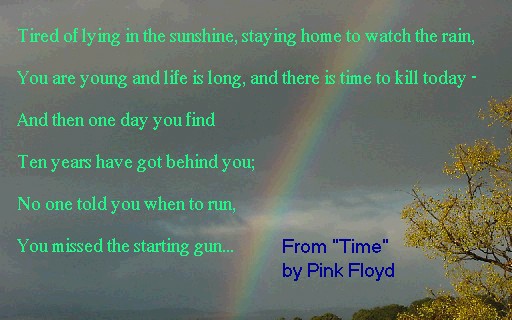
This page completed on Tuesday, 7th April 2009
Yeah - well, that could be the story of my life!
So what's this page all about?
Something to do with spectra, obviously (and yes, that's the correct
plural form of the word). The rainbow in the picture above is one kind of
spectrum - the visible light spectrum, which is part of the
electromagnetic spectrum
which extends from extremely low frequency radio waves right up to gamma
rays, with the visible part just a small region in the "middle" - whatever
that means, in a logarithmic scale! (The above rainbow, which occurred on
Tuesday, 12th February 2008, has featured in this website once previously,
in my
"new millenium"
page.)
Wavelength (m)
Then again, in the early 1970's there was an Aussie progressive rock band
called Spectrum. (Remember when "progressive rock" wasn't a pejorative
term? *Sigh*) They had a big hit in 1971 (their first, I think) with a
song called "I'll Be Gone". The words appearing to come from the heavenly
regions in the picture above are the first three lines of lyrics from the
song. (I thought it was entirely appropriate, in these troubled economic
times, to put them up there, "somewhere under the rainbow."
I found
this web-page
which has information about the band (which still exists, and still does
gigs - God bless 'em!) and links to YouTube videos of them performing at
various times in their career, as well as a YouTube interview with Mike
Rudd, singer and multi-instrumentalist with the band. Very interesting,
and lovely to hear that old song again...
UPDATE, Tuesday, 31st May 2011:
The link to the YouTube version of the original 1971 version of the song on
that page doesn't work any more, but I've since found
this one
which does - although I don't remember the original having quite such a
pronounced reverb as this one has! However, I could be wrong...
(I wonder how long that link will last...?
UPDATE, Friday, 11th March 2016:
Well - it lasted for quite a while, but now it's gone "private", with the
viewer needing to have "permission" to view it! Why do people find it
necessary to do things like this?
Never mind - here's
another one!
Fingers crossed...
But there's another meaning of the word which seems to have entered common
parlance over the last few years: "on the spectrum". The spectrum being
referred to here is the autism spectrum.
Just what is autism?
The Concise Oxford Dictionary, eighth edition (1990), defines it as
follows:
autism n. Psychol. a mental condition usu. present from
childhood, characterized by complete self-absorption and a reduced ability
to respond to or communicate with the outside world.
There's a stereotype, of course. You've probably seen, as I have,
television dramas in which there's an autistic kid who sits in his/her
bedroom and listens to the same music over and over again, staring fixedly
at the floor or the wall and rocking back and forth with a blank facial
expression - which erupts into fury if anyone else enters the room and
tries to interact with him/her in any way.
No doubt that's real enough, in some cases. But the apparently recent use
of the word "spectrum" in connection with the condition seems to suggest
that other, less extreme personalites and behaviours have at least
something in common with "classic" autism - and that may or may not be
helpful in understanding and "dealing with" such people.
There are any number of websites which deal with autism, often using terms
such as "autistic spectrum disorder". The idea seems to be that there is
not just one kind of autism, but several, of varying degrees of severity -
but that they are all in some way negative and require "treatment" of some
kind, as implied by the use of the term "disorder". Is that necessarily
true?
Please - allow me to share some of my own experiences with you, in
attempting to deal with this question.
+
+
+
+
+
At the outset, may I stress that I neither need nor want anyone's pity.
What I do need is people's respect; and what I'd like is
their understanding.
I served one year in kindergarten before starting at primary school.
Within a very short time after commencing Standard One, a decision was
made on my behalf by my elders and betters (with the best will in the
world, I'm sure) that I should immediately be promoted (or "put up") to
Standard Two. As a direct result of this, I was the youngest kid in the
class, a situation that was to continue for many years.
To be sure, I had no problem with the "work", if such it can be called in
the very junior classes. However, I didn't really fit in, and made few
real friends.
When my family emigrated to Australia at the end of my Standard Three
year, I was placed into Grade Four (in Australia the word "Grade" was used
in place of the British "Standard"). I was still the baby of the class,
and I still had few friends. There was one boy who had been the youngest
in the class (I believe) until I came along, and we did become best
mates for several years. I think I had a sense, even at that young age,
that I'd struck lucky in that regard, because - again - I had difficulty
in forming many other friendships, both then and later.
There were at least three obvious factors contributing to this: firstly,
as mentioned, I was the baby of the class; secondly, I was the Pommy kid
with the posh, snooty English accent (and the somewhat hoity-toity manners
to match); and thirdly, to be blunt, I was "more academic" (as we'd say now,
rather than "brighter" or "cleverer", as we'd probably have said back then)
than most of my classmates, especially with regard to arithmetic (or "sums",
as it was unofficially called).
In truth, there was also a fourth factor: my hopelessness at sport. (In
Australia, if you're a kid who doesn't like sport, you've got a problem,
mate - believe me.)
What I didn't know then - and neither did anybody else, apparently
- was that there was a fifth factor (which we'll get to shortly).
As it turned out, I wasn't the only smartypants in the class. There were
two other lads with whom I realized that I had something in common, in
that regard. By Grade Five or Six, the three of us politely considered
ourselves to be "the three geniuses" of the school! (But we had the good
sense not to tell anyone else about it, lest they feel inferior.
In Australia, primary school goes to Grade Six, then it's off to high
school, which (for government schools) has four Grades (Seven to Ten).
Until the mid-1960's, the high schools had gone right through to Grade 12;
but by then the move was on to have Grades 11 and 12 in matriculation
colleges. (The private high schools still went through to Grade 12,
however.)
The year I went to high school was for me a year of change in several
respects. My best mate - for reasons I never fully understood - repeated
Grade Six, and my other good friend - one of the other two "geniuses" -
went to a private school. So I was a lonely kid in a new environment, who
- yet again - only made new friends to a certain extent and with
considerable difficulty.
By high school, the hormones are starting to kick in as kids turn into
adolescents. My classmates soon left me far behind; I had no idea what was
going on. As part of that whole process, there was a certain bitchiness in
high school which was absent in primary school; as a direct result, I
became more and more an outsider, steering clear of my classmates for the
most part just to avoid trouble.
By Grade Ten, I was completely unsocialized, and absolutely fed up. I had
no difficulty doing well enough academically to go to Matric. the
following year; but I persuaded my thoroughly bemused parents to allow me
to repeat Grade Ten just to get into my own age-group, thinking that my
problems would then immediately be over.
I was wrong. Having no social skills at all, I found that year to be the
most agonizing of all my school years. But I learned quite fast; and by
the end of that year I was looking forward to starting at Matric.
(at Launceston Matriculation College, as it was then) and having a fresh
start, with a bunch of bods from lots of other feeder schools who didn't
know me - and that did indeed happen. (One really good thing was that I
caught up again with my old best mate from primary school, who'd repeated
Grade Six.) That was
1969
- and wasn't that a memorable year, in all sorts of ways!
I knew something still wasn't right, in spite of the very welcome fresh
start. I endured some months of what is known as "anxiety depression". I
was at my wit's end. What did I have to do just to be normal?
It was the following year, 1970, that I became involved with a local
evangelical Christian group - some of whose members were fellow-students
at Matric. - and became what is known by the now clichéd term "born-again
Christian". As a direct result, and with the support of a new group of
genuinely-caring friends, my life began to settle down into a certain
normality, and some real healing took place.
I couldn't wait to start at university. After two years at Matric., with
some stability in my life and a burning desire to understand everything I
could find out about mathematics and the physical sciences, I began my
life as a uni. student with sheer delight. I found that I absolutely
adored the lifestyle, the freedom, the feeling of being a young adult
setting out - at last - on life's great adventure. With my strong
Christian connections and my burning desire to learn, life couldn't have
been better.
But there was still a problem. Quite soon, I found that I was struggling
with the academic content. Never having had to swot at school, and not
much even at Matric., I found that I was in trouble - because I didn't
know where to start. Whereas most of my friends would calmly settle down
in the evenings for a few hours of study, I just couldn't do it, somehow!
- and it became clear that to survive as a uni. student one just had
to study. (I also found it extremely difficult to get organized in physics
and chemistry practical classes, and would get dreadfully behind.)
I didn't do well at the end-of-year exams. I was going to have to repeat
almost everything. I was devastated.
I did repeat the subjects, and although I still didn't know how to study,
I somehow managed to gain - by some kind of osmosis - the understanding I
needed to survive well enough to get into second year. But I was uneasy,
because it was well-known that second-year subjects - especially in
mathematics - were a huge hurdle.
I knew by the middle of the following year that I was in real
trouble. I failed almost everything; I managed to salvage a terminating
pass (which, I believe, meant 40 to 49 per cent) in organic chemistry.
It wasn't a happy time. It seemed that my dreams were in tatters. Now
what?
I saw in the newspaper an advertisement in the "Positions Vacant" column
for a Technical Operator in ABC Radio in Hobart. I applied for it - and
was successful!
I started in my new job in early 1974, and found that I loved it. However,
I was bitterly disappointed that my uni. career had stalled. I quietly
re-enrolled in the second-year maths subjects, and went to lectures when I
could (the job was shift-work). For the first time, I began to do some
real study - and at the end of the year, I passed all three subjects. What
a buzz!
Bear with me while I choke back a few tears...
*
*
*
*
*
*
*
My job at the ABC was mostly as a control operator. In those days, in
Hobart, there were two ABC radio stations: 7ZL and 7ZR. I was in each
station for half the time; and in each case, half the time in a particular
station was on morning shift (starting in the hours of darkness, getting
the station on air for the day) and the other half on evening shift
(starting around lunchtime and finishing soon after midnight by switching
everything off).
7ZR was the station for light music and talk-shows. Every evening, there
was a program called "Music to Midnight" which was full-on jazz (most of
it of the cooool variety, man). I'd never liked it before I got the
job, but I grew to love it, in a strange, detached way. In the evenings,
when I was there by myself in my control room - in my little empire,
basically in a night-watchman capacity - I could sit there and study for
my uni. maths subjects, and the music set the mood so well.
7ZL was the classical music and documentaries station. I loved it in
there. I already liked classical music anyway, but I heard things in there
that I'd never heard, and it was mind-expanding. Again, in the evenings it
was a night-watchman job, with the programs coming down the line from
Sydney (mostly), just as in 7ZR - and, again, I could study. I just had to
remember to keep an eye on the VU meter levels and make sure, every hour,
that the Tasmanian state news (read by one of our own announcers in the
Hobart news-room) went to air after the national news, before switching
back to the feed from Sydney.
I took my camera with me to work one day when I was in 7ZL, and that
evening asked my mate in 7ZR to take some pictures of me. Here are just
four of them (click on them to see bigger versions):
Oh yeah - I was quite the dashing young lad back then!
On one occasion, the program coming down the line was Gustav Mahler's
fourth symphony. I hadn't known anything about Mahler until then; and as I
listened to this amazing, emotion-packed masterpiece, I was absolutely
spellbound. The anguished beauty of it nearly broke my heart. It has
remained my favourite classical piece ever since.
To view a YouTube video of that symphony's fourth and final movement - a
song expressing a child's somewhat disturbing vision of life in heaven -
visit
this page,
which also features an English translation of the lyrics, with commentary.
(In addition, you'll find another YouTube link there, to a version of the
very delightful and slightly quirky second movement.)
To most of the other guys who worked there, it was just a job. One of them
once even described it as soul-destroying. I couldn't understand why; to
me, it was anything but. Why, oh why, did I walk away from it...
But I did. In my later years, I've come to regret bitterly the fact that I
left my lovely job after only one year to go back to uni. full-time in
1975, finally able to start the third-year mathematics subjects I'd been
looking forward to for so long.
*
*
*
*
*
*
*
1975 was a happy year. (Quite apart from my improving personal fortunes,
looking back I think that the mid-1970's were the nearest that our society
ever came to a "golden age". I've made a brief allusion to this previously
in my
It's never too late
page.)
I'd earned enough money at the ABC to rent a shared flat and even buy
myself a second-hand car. University was fee-free at the time, and food
and petrol were cheap. After a year away from the uni. culture, which I'd
grown to love over the previous few years, I was able to get back into the
swing of things; most important in that regard was the ability to become
fully involved again in the student Christian fellowship of which I was
still an enthusiastic member.
Mad Teddy leads the singing (1975)
(Love the socks
But I wasn't able to finish just yet. 1976 saw me poorer and back in the
men's residential college in which I'd spent my first three uni. years.
(That was the year that I first became known as "Teddy".)
By rights, I should have finally finished my B.Sc. degree by the end of
1977 (which, again, I spent at that men's college) - but it wasn't to be.
I still needed three more points (one-twelfth of a full year's load).
In 1978, I stayed with a fellow with whom I'd made friends in organic
chemistry lab sessions and who owned a cottage. I managed to get a job as
a clerk in the Commonwealth Public Service (which I found to be a
real grind), and finished off my last few points, earning a
distinction. Whew - what a relief, finally, to finish my degree!
Of course, by now my original classmates had long since finished uni. and
were working, while I was still plodding along. I wasn't the "baby of the
class" any more, by any means - I'd become very much a "mature-age"
student. Oh dear! - and I still had to do my Diploma of Education
(Dip.Ed.) in order to become a teacher.
Around Easter, 1977, I'd met the girl who would later become my wife. We
were married in February 1979; and I commenced my Dip.Ed.
Having finally learned "exam technique", I had no trouble passing the
theory subjects. It was when I went prac-teaching that I began to realize
that I might have made a huge mistake. Finally, that fifth problem from my
school-days was going to come back to bite me after all.
I found that I was in real trouble in front of a class of kids. I'd always
had a lack of ease about eye-contact even in my normal relationships with
such friends as I'd had down the years; now, it was a serious problem. As
a teacher, you have to be able to stare kids down, sometimes. I found it
extremely hard to do that; and the "rattier" of the kids sensed my
discomfiture immediately, of course - and I had severe discipline
problems. I'm afraid I failed prac-teaching in 1979.
The eye-contact problem wasn't made any easier by the fact that, by then,
my left eye was pretty much completely useless, and even "on-side"
students would be regularly looking over their right shoulder to see whom
I was really talking to - and that's a problem that only got worse,
not better, as time went on.
If I'd known then what I know now, I think I'd have changed course right
then and there. But I didn't know; and I'd always wanted to teach
mathematics, and share my joy in knowledge. Silly naïve me - I honestly
thought my enthusiasm would be infectious, and that school-kids would just
pick it up from me and love the subject!
So - I had to repeat prac-teaching in 1980. By being crafty (and I
honestly can't remember how I pulled this off, now!) I managed to wangle
my way into doing it at matric. colleges; and somehow I survived. Finally,
after ten years at uni., I was a trained teacher.
However, things had changed. Times were tougher, and I wasn't able to
simply find a teaching job. Plus, there was competition from younger
graduates who had finished while I was still being a "professional
student"
I did learn to teach adequately, but I was only ever a borderline
school-teacher. There were some very good experiences; some classes
in some years were truly "on-side" and there really were some very happy
times - but it was, to a large extent, hit-or-miss. The time eventually
came when I absolutely kicked myself for having left the ABC. Regrets,
I've had a few; and this is one I have to mention. If only I'd known...
In the mid-1980's, by which time I'd faced up to my error, I did a
computing course at a tertiary institution, and landed a job putting
together a piece of educational software at another tertiary institution.
That job extended to three years, during which time I became involved in
teaching again - adults, this time - which was often very satisfying. I
was ultimately employed there for nearly nine years.
However, in 1993, "economic rationalism" became the new religion, and the
madness which ultimately led to the economic disaster which the world is
currently enduring began to occur. My workplace started to undergo ugly
changes; many of my colleagues saw the writing on the wall, and had the
good sense to get out before the...
Doubting my chances of finding another job, I stayed, as it all came
unstuck. Having reached a point in my life where I was no longer willing
or able to suffer fools gladly, I became angry enough to start getting
involved in industrial action. I became very vocal, ultimately losing my
temper completely. Big mistake - I learned my lesson too late. "Mr. Big"
found a way to ease me out - and I've been unemployed ever since.
So - just what is this "fifth problem" or "fifth factor" to which I've
been referring?
By way of introduction to the issue, may I invite you to click on
this link
and read carefully what you find there. (As mentioned elsewhere in my
website, the term "geek" is not one which I like to apply to myself - but
that aside, the article makes some very good points.)
Sound like someone you know?
I only heard about Asperger's syndrome for the first time around the
middle of last year (2008), when someone close to me asked if I thought I
might have a touch of it. When I did some research on it, the answer had
to be an emphatic "yes".
So - how bad is it? Is it a "disease"? Does it need a "cure"?
As I mentioned earlier, there are plenty of websites which mention
"autistic spectrum disorder".
Now - what gives someone who doesn't have Asperger's syndrome the
right to brand those who do as having a "disorder"?
Please - have a careful look at
this
web-page, which addresses the issue in a tongue-in-cheek manner but which
makes some very telling points.
UPDATE, Tuesday, 31st May 2011:
Bum - now that's disappeared!!! It was a very witty page put up by
the "Institute for the Study of the Neurologically Typical". Please, if you
know what's happened to it - if it's simply "dead", or if it perhaps just
has a new URL - do me a favour and
let me know,
would you? Thanks!
UPDATE-WITHIN-AN-UPDATE, Tuesday, 31st May 2011:
I've just found a page which has at least some of the original
content of that ISNT page which has gone missing; click
here.
Fingers crossed...
=> Extra, extra...
It's also
here
- in fact, to my delight I've found several pages with that content
included, by Googling on "autistic outrage", which I remembered from the
original. (Clearly, I'm far from the only person to have liked it and taken
it to heart.)
UPDATE, Thursday, 19th May 2016:
I'll admit to increasing exasperation when I notice that just about every
news item about autism these days - whether in print or the electronic media -
refers to the issue in terms of "autism spectrum disorder", or something very
similar. It seems that the message is not getting through.
What can a fellow do? Well, I suppose I can add yet another update to my
web-page about it, and hope that someone, somewhere, reads it, and "gets" it -
and maybe passes the message on! Not much, perhaps; but one does what one can!
So here goes:
I've just found a web-link which absolutely puts this matter in perspective.
It's a Word document entitled "Is Autism a Disorder?" - and the answer given
to that question is a very firm NO.
Here's an excerpt from the document:
People with autism are not disordered (the irony with the term being that so many
people with autism are highly ordered in their thinking), nor should we automatically
dismiss developmental differences as impairments. Certainly the neurological
complexities can be baffling to the NT - as, equally, the NT world is baffling to the
individual with autism. This does not make either or both populations disordered -
simply, different. In order to support individuals with autism we must accept that
differences do occur, but at the same time recognise and accept that difference is
not synonymous with disorder.
(Note that "NT" is short for "neurologically typical", or simply "neurotypical".)
May I urge you to have a good, hard look at that document - which makes its point
passionately, even though it is written by an NT person.
Here's
the link. To read more about the document's author, visit
this
page, and also click on some of the highly relevant links within that page.
Another web-page which deals with this issue is
here.
(Note, however, that even this page falls into the trap of using the disparaging
term "autism spectrum disorders" at one point.
So what's the big deal about slapping a name (Asperger's syndrome) on a
condition that affects some of us?
I'm reminded of a joke attributed to Mark Twain about how God asked Adam
to name the animals. God organized a procession, and as the animals went
past, Adam would point and say "cat", "millipede", "horse", "diprotodon",
"daddy-long-legs", "Tyrannosaurus rex", "Tasmanian devil", or whatever.
When an odd-looking creature with a long tube where its nose ought to have
been trundled past, Adam said "elephant".
Later, when Adam went home to Eve after his exciting day's work, she
enquired: "What did you call that big grey animal?" Adam told her, and she
asked: "Why did you call it an elephant?" Adam replied: "Because it
looked like an elephant!"
I suppose being able to give something a name allows us to organize it in
our thoughts, to see it in some kind of perspective, to place it in
context. To know that some of us extreme nerds (or geeks - ugh) have
something in common that actually unites us, and tells that we are not
just "misfits" after all, is very liberating. We are members of a club.
We don't need funny handshakes, or membership cards, or badges on our
lapels - or even lapels at all, for that matter - to recognize each other.
Let me tell you something that happened just a few weeks ago.
I mentioned earlier that, when I was at primary school, there were three
of us who thought of ourselves as "the three geniuses". You may think that
sounds cocky - even arrogant - and you may be right. But we knew there was
something different about us, that set us apart from the other kids.
I also mentioned that one of the other two geniuses with whom I got on
pretty well had gone to a different high school than the one I went to,
and that we hardly ever saw each other after that, for various practical
reasons. The last time we'd seen each other must have been in the
mid-to-late 1970's. But we had a friend in common with whom we'd both kept
in touch over the decades - the fellow mentioned earlier whom I'd come to
know in organic chemistry prac. classes, who'd gone through the same high
school as my genial primary-school friend (pun intended). Last Christmas I
made a point of asking him if he could put me in touch with my old buddy.
He did so, and we organized a meeting.
I was a bit nervous about how things would go. After all, it had been a
long time, and people do change to some extent. (I suspect he probably
felt the same way.) But from the moment we met, it was if thirty-something
years had just dropped away.
All the memories were crystal-clear. We both recalled the good and bad
things that had happened some forty-five years earlier. We spent an
evening of great hilarity, as we tracked our respective careers over that
long time, and found that we could easily affirm each other's experiences.
Among other things, he told me that he'd been diagnosed with Asperger's,
which didn't surprise me one little bit.
The most astonishing thing that emerged was that we'd both taken eight
years to get our respective degrees! We were dumbfounded. He was the first
to break the spell, saying "We could have been twins!"
+
+
+
+
+
For my 56th birthday, just a few weeks ago, someone close to me gave me a
book entitled "look me in the eye - my life with asperger's" (all lower
case, just like that), by John Elder Robison. I'm about halfway through it
as I type this.
It's a fascinating read; and again, it's liberating to know that there are
others out there who understand, because they have personal experience.
Have a look at Mr. Robison's website, where you can see photos of both the
author and his book:
http://www.johnrobison.com/
In the book, he tells of how he was diagnosed with Asperger's, and how he
found the experience liberating, much as I've described in my own case.
(Note: I haven't actually been diagnosed with it officially, but I
know I have it without needing to have that happen, just as I know
when I've got cramp in my leg or a toothache.)
He's a great storyteller, with a fabulous sense of humour. There are lots
of alarming anecdotes about scrapes he got into and tricks he got up to
during his young years. Again, it all rang true (and no, I'm not
going to put all my own goings-on down here for you to read - not yet, at
least! Maybe someday...
There's a link on Mr. Robison's homepage (above) which presents reviews of
his book. Here it is - check it out:
http://www.johnrobison.com/theysay.asp
- and have a look around other pages on his site too.
As I've mentioned, I only became aware of Asperger's syndrome, and
recognized that I had it, sometime in the middle of last year (2008).
Then, shortly after that (28th August), ABC television's science program,
"Catalyst", presented a story dealing with a new theory concerning the
causes of Asperger's syndrome.
The programme focused largely on a young Englishman named Daniel Lightwing
who has the syndrome. One of the main points which emerged was that
Asperger's is not merely a "disability", or a "disorder", but has
strong positive aspects: although people with the syndrome have difficulty
in social interactions, they often have more ability to concentrate on
details and understand systems than do most people. So it's a gift
- albeit one that comes at a high personal cost for those that have it.
As I write this, the program is still available for viewing on the ABC's
website. I urge you to visit the site and have a look; it's a moving and
heart-warming story. Here's the URL:
http://www.abc.net.au/catalyst/stories/2346896.htm
The question arises: how has Asperger's impacted upon society? In
particular, how many people who have had a major impact on history have
the syndrome?
There are websites which list famous people who "fit the bill". Here's
one:
http://www.aspergerresources.com/famous_people_with_aspergers.html
Here's another:
http://www.inthelight.co.nz/spirit/aspergerpeople.htm
That one I find particularly interesting, for a number of reasons:
It's interesting to note the presence of Nikola Tesla's name on the list.
My own website has a lot to do with Tesla and his legacy. If I believed in
reincarnation (which I don't, being a Christian), I'd be inclined to think
that there may well be a large helping of Tesla's personality within my
own.
Another feature of that page just quoted is a list (at the bottom) of
characteristics exhibited by Asperger's people. One in particular stands
out, in my personal view:
Greater empathy with animals and nature than other human beings - eg St Francis of Assissi.
Concerned with the planet and environment, not the trivialities of the personal lives of their students.
Tesla went there and did that, too. He had his
pigeons,
and I had my
bunnies
(and my
toy whales,
of course!) - and, again, Tesla was concerned with the condition of his
world, just as I am, perhaps to the detriment of social relationships.
(I'm sure you must have heard the old jibe often trotted out to mock
self-styled "touchy-feely" people: "I love humanity - it's people
I can't stand..."
- And if I'm honest I'll have to admit that there's more than a grain of
truth in the suggestion that, as a teacher, my love for my subject was
greater than my concern for my students - although I did work on that
later, and (I hope) redressed the balance, at least to some extent.
Another observation about Asperger's people from the second of those two
sites whose links appear above:
Rough sense of humour - some of the Western occult school teachers such as Gurdjieff were
known for playing tricks. Monty Python type humour which can be a little off-beat.
While on the subject: be grateful that, in my
poetry and music pages,
I've left out a great many of my other poems and songs. (Actually, before
I launched this website in July 2006, I had some of those other items in
the site for your edification - but I thought better of it and removed
them before the big day. Will I ever reinstate them? Perhaps - but first
there's a sick planet to sort out; maybe then, when it doesn't matter so
much whether I annoy people, I'll put them back - but for now it's
important to keep folks onside, rather than going out of my way to
get them offside.
First things first.)
Another of the observations about Asperger's people which rates a mention
on that site is their tendency to be prone to sudden bursts of anger. I've already
mentioned how that cost me dearly, some years ago. Self-control is
difficult, but important. Enough said.
One other web-page which lists possible Aspergians is
this Wikipedia page.
Among the names there are many which are also on the two other sites
mentioned above; but this one also has Gustav Mahler - the composer of my
favourite symphony - on the list.
One final observation about Asperger's in history and society: all three
of those websites whose links appear above mention Isaac Asimov as being
on the list. Again, someone with whom I've felt a kinship over several
decades. (Asimov was a great perpetrator of knockabout humour, too.)
There's a website called
Adults With Autism Speak Out
which has links to a number of YouTube videos made by Asperger people,
basically telling their story. As you'd expect, they're a bit odd, in one
way or another; but as you'd also expect (by now, I hope), there's plenty
of self-deprecating humour in evidence. (Whether that's a part of the
syndrome that simply "goes with the territory", or whether it's something
we have to cultivate over time if we are going to survive at all, I don't
know - but it's a good trait and it makes for a certain lightness of
spirit.)
+
+
+
+
+
Here's a link to one such video by a fellow who wants to tell his story:
"Asperger's Syndrome, I've got it."
He shares my interest (and John Robison's - and Tesla's, of course!) in
electronics; and - here's a surprise for a "Generation Y" person - he
seems to like Bob Dylan! How about that? (Some of those "list" websites
place Bob Dylan on the Asperger's list - could this be significant?)
One amusing feature - which appears to be unrehearsed - is his
mother interrupting the proceedings to tell him it's bed-time! God bless
mothers - where would we be without 'em? (I suppose we wouldn't be
anywhere, really, would we?
At one point he says: "I am glad I've got it" ... "if I was asked, 'Hey -
do you want to stop having Asperger's syndrome?', I'd say 'no'..."
-
YAY!!!
That's what Daniel Lightwing said, too. More power to both of them! We are
what we are; and we should insist on the right to our own identity.
+
+
+
+
+
Until recently, there were three videos on the web by a girl in her
mid-twenties with Asperger's Syndrome who had something to say about it.
The first of these was basically an introduction to the subject matter.
In the second, she asked and addressed three questions:
"What is Asperger's?"
- and, quite clearly, these are difficult questions that cannot be
answered glibly.
In the third video, her main purpose seemed to be to encourage people with
any "syndrome", or "disorder" or "disability" - or whatever
- to refuse to allow it to rule their lives:
"Be a whole person, who has a unique and
- which I think is absolutely the best advice anybody could ever give on
the matter. To put it in the Aussie vernacular: "Good on ya, Emily!"
She has recently taken those three videos down from the web for personal
reasons. From my own perspective, I think it's a pity because they were
so good, with loads of wry humour mixed in with the very serious
message she was sending; but, as a fellow Aspergian, I can understand her
point of view. I wish her well, and hope that she may re-post them at some
stage - in which case, with her permission, I'll re-post the links to them
here.
In the meantime, however, there are some things by Emily that are
still on the web; one that she encourages people to have a look at is a
graphic novel
in which she addresses various issues including nuclear warfare and
Asperger's Syndrome from a highly personal point of view. I was fascinated;
do check it out.
+
+
+
+
+
Here's another web-page by another person with Asperger's which I found
extremely interesting. It may be somewhat off the beaten track, but
- somewhat to my surprise - I found myself nodding in agreement. While I'm
not sure that I necessarily follow all the preliminary discussion, many of
the conclusions accord with my own experience; if you've had a look at some
of my other pages, you may see what I mean.
Here's
the link; excuse the occasional typo (in particular, the misspelling of
Freud's name!
Let's wrap this up. By now, hopefully you have a reasonable idea of what
Asperger's syndrome is all about, along with the concept of being "on the
spectrum".
As I said at the top of this page, Asperger's people don't want or need
pity. If we've survived the nastiness of school bullying and teasing, we've
developed a thick enough skin to survive reasonably well - and, as I've
pointed out, we learn how to laugh. Things could be a whole lot worse.
To close, a personal anecdote about school bullying:
Kids are kids. Not all kids who get put through the grinder in school have
Asperger's; and the bullies (hopefully) grow out of it over time and join
the human race, eventually. It's a tough world all round, really, isn't
it? But we muddle through, as we must.
In the 4th April 2009 edition of "New Scientist", there's an article
entitled "The five ages of the brain". These are: 1. Gestation - Setting
the stage; 2. Childhood: Soak it up; 3. Adolescence: Wired, and rewiring;
4. Adulthood: the slippery slope; and 5. Old age: Down but not out.
The one that concerns us here is 3. Adolescence: Wired, and rewiring. The
opening sentence is:
"Teenagers are reckless, irrational and irritable, but given the cacophony
of construction going on inside the adolescent brain, is it any wonder?"
The article mentions the traditional explanation for teenage behaviour,
"raging sex hormones", and then goes on to discuss more recent research
into profound structural changes occurring in the brain during those
difficult, painful years.
No doubt, it's a combination of factors which make teens into
highly-strung, emotional, somewhat bratty creatures. The part of the brain
which (according to the article) settles down last is the part concerned
with judgment and decision-making. So it's not too surprising that there's
a certain nastiness in evidence at times.
In the late 1990's, a 30-years-on school anniversary was organized for my
final year (i.e. Grade 10) high school class. I went along, somewhat nervously,
wondering how I'd fit in. (This was the class I was in before I
repeated Grade 10.)
As soon as I got to the hotel where the event was being held, I looked
around the sea of forty-somethings, some with greying hair, some of the
blokes completely bald, to see if I could recognize anybody. One woman
sitting at a table saw me and gave me a smile. I may be Aspergy, but I
could read a "welcome" sign in that smile. (This is breaking me up,
writing this.)
I went over, sat down, and said hello. She seemed a bit shy and
embarrassed. Before long she was apologizing for what had happened all
those years ago. It had obviously been eating away at her for three
decades.
I was deeply moved. I'd never expected anything like this. It was a real
joy to be able to return her shy smile and offer my forgiveness. We'd all
grown up - how wonderful!
It was a lovely evening. Sixties music was playing; there were other eyes
glistening. I stayed for quite a while, but I left before most of the
others did because they were starting to gather into little knots of old
friends and catching up - and since I hadn't been part of that scene back
then, there wasn't really a place for me. I didn't begrudge them; I was
happy for them. I left with a song in my heart.
- And just a few days after that, I walked away from my job.
It's not easy having Asperger's. It never goes away - but neither should
it. Those of us who are afflicted have our strong points. I believe we
have at least some ability to see further than most people - to have
"vision", if you will. (Consider the Beethovens, Teslas, Mahlers,
Einsteins and Asimovs of this world.) It's the recognition of that vision
within myself that has driven me to spend the last four years creating
this website.
So don't waste pity on me. Give me some respect, and offer me some
understanding - but most of all, I'd hope that you might look through this
website, see what I'm trying to achieve for my children and grandchildren
(and yours!), and get involved to help make it happen.
UPDATE, Monday, 8th March 2010
I've just visited John Robison's site again, and thus found my way to a
YouTube video of him speaking about his involvement with something called
TMS. Absolutely fascinating; here's the link:
http://www.youtube.com/watch?v=RvUgFoHsEmU
Check it out, and then follow some of the links within that YouTube page to
other videos featuring Mr. Robison. In particular, watch this one:
http://www.youtube.com/watch?v=BIZsYGxXHis
- which features an interview with J.R. (about his book) by his brother,
Augusten Burroughs
(who has written some books himself), and which is full of cheeky humour.
Just one more - if you can spare an hour or so to listen to J.R. giving a
talk to (and fielding questions from) an audience, you probably can't do
better than to watch this YouTube video:
http://www.youtube.com/watch?v=-gLASWGkkn0&NR=1
- in which he gives very practical hints to people affected by Asperger's
Syndrome regarding how to empower themselves and improve the quality of
their lives.
%
%
%
%
%
Can you spare another few minutes to read some of J.R.'s thoughts about the
state of play regarding research into Asperger's (including the phenomenon
known as TMS)? It's well worth it! Here's the link:
http://jerobison.blogspot.com/2010/02/new-from-tms-lab-and-autism-research.html
Interesting times...
Return to Unequivocal ursine utterances menu
... or ...
Return to my My second monopole motor page
On the spectrum
(and added on Friday, 10th July 2009)
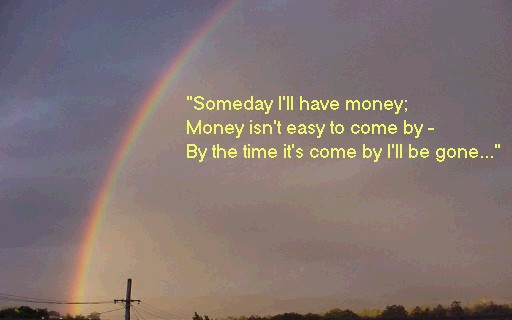

103
102
101
100
10-1
10-2
10-3
10-4
10-5
10-6
10-7
10-8
10-9
10-10
10-11
10-12
Radio waves
Microwaves
IR
UV
X-rays
Gamma rays

VISIBLE
106
107
108
109
1010
1011
1012
1013
1014
1015
1016
1017
1018
1019
1020
Frequency (Hz)
 )
)
 )
)



 )
)

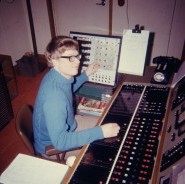
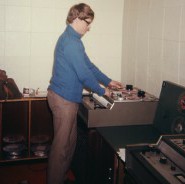
Getting ready to roll a promo
Lacing up a tape
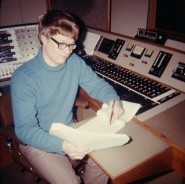
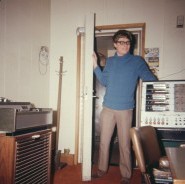
Filling in the log book
"TA-DAAA..."
 How it all comes back...
How it all comes back...
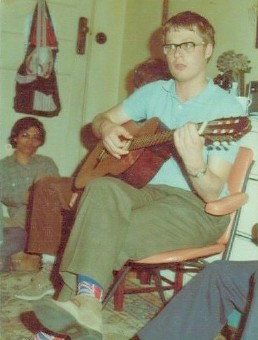
 )
)
Although I didn't pass every unit that year, I passed most of them, and
even managed a couple of credits (one of them in second-year organic
chemistry, which I'd unsuccessfully attempted a couple of years earlier;
and the other in a subject disarmingly called, simply, "Geometry", which
was about projective geometry, and which I found utterly
fascinating). I even got a high distinction for one other small
mathematics unit! That felt really good - a huge boost to my
self-confidence. I could do it, after all...


 - and of course I didn't stand much of a
chance. I was only able to get bits and pieces of relief teaching, at
first.
- and of course I didn't stand much of a
chance. I was only able to get bits and pieces of relief teaching, at
first.



 ) The
young gentleman with Asperger's who is the subject of this page has put together
a short cartoon video which addresses the issue of how autistic people are often
treated by society at large, as opposed to how they should be treated.
That video is on YouTube
here.
Go on - have a look!
) The
young gentleman with Asperger's who is the subject of this page has put together
a short cartoon video which addresses the issue of how autistic people are often
treated by society at large, as opposed to how they should be treated.
That video is on YouTube
here.
Go on - have a look!
 )
)



Yep - been there, done that!
 )
)
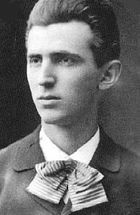
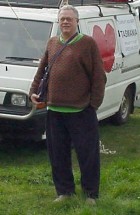
(There is at least one area in which I differ quite markedly from Tesla,
however: he always dressed like a dude, whereas I almost always tend to
dress like a slob.)


Again, amen to that. Get hold of a copy of John Robison's book "look me in
the eye..." (mentioned above) and read it, to see what this is all about.


 )
)
"What is autism?"
"What is normal?"
beautiful mind. That's what you should do."
 ) and just get the gist of what is
being said.
) and just get the gist of what is
being said.

